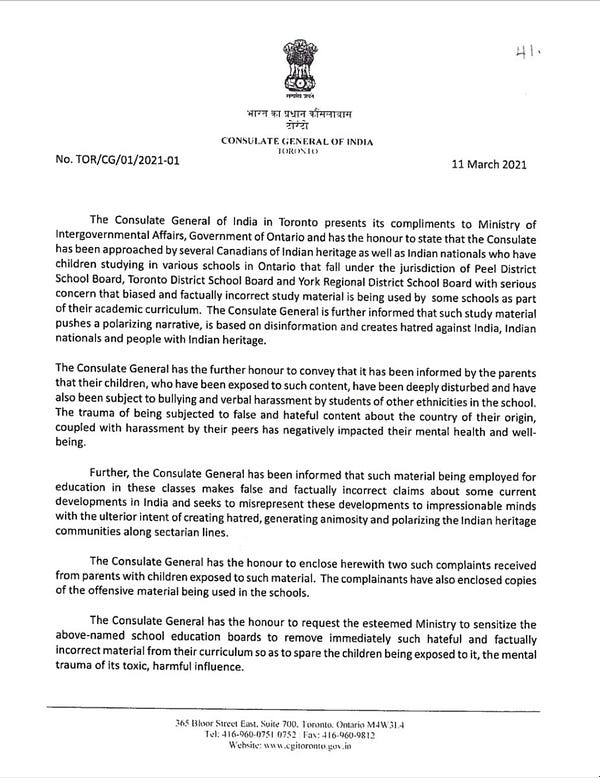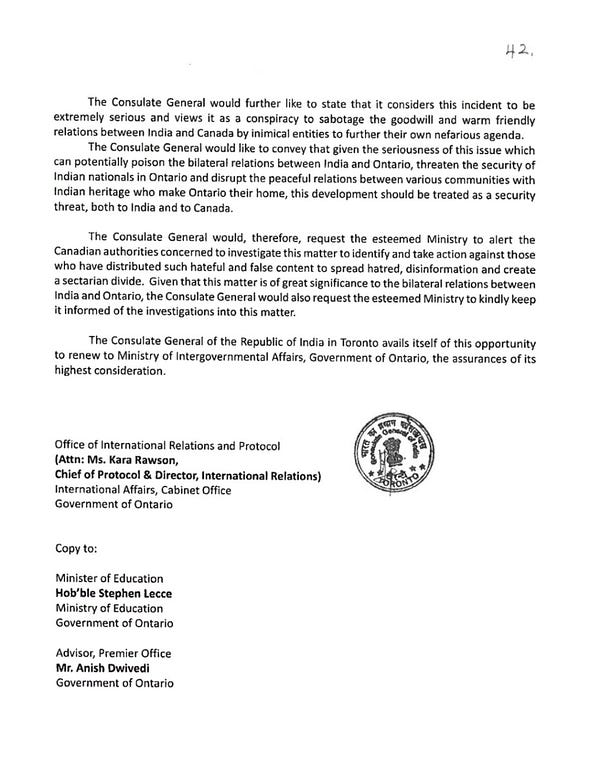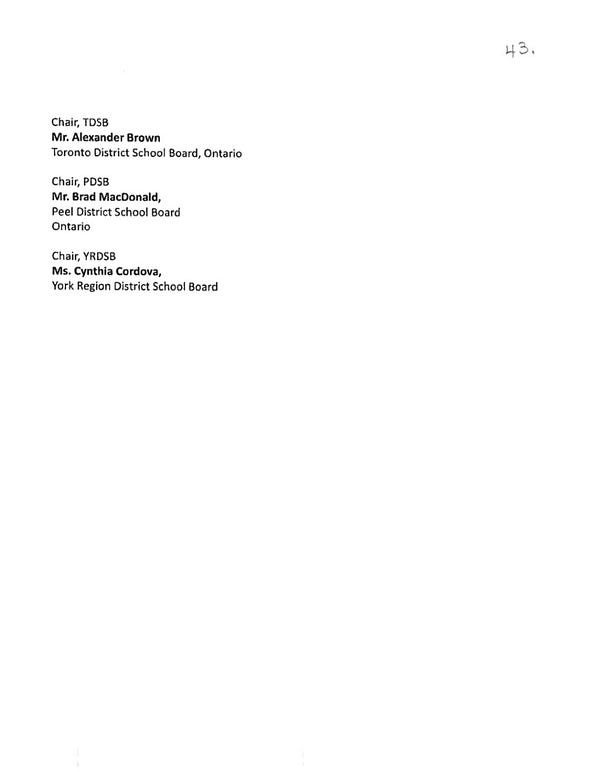Monika Sidhu: Canadians Denounce India's Attempt To Interfere With Classroom Discussions On Farmers' Protest
“The Ontario teachers are doing what good educators must do - keep their students critically engaged in the world around them and make links between what is happening in their backyard and elsewhere.”
Monika Sidhu
June 22, 2021 | 4.5 min. read | Original Reporting
Teachers, students, parents, and politicians across Canada expressed concern and shock over the weekend as news broke of the Consulate General of India’s failed attempt to censor and interfere in Ontario classroom discussions regarding the Farmers’ Protest.
The Consulate had written a letter to Ontario’s Minister of Intergovernmental Affairs, Doug Ford, threatening bilateral relations if teachers and students continued to discuss the issue.
The Minister of Education, Stephen Lecce, Advisor to the Premier, Anish Dwivedi, and the chairs of the Peel, York, and Toronto District School Boards were copied to the correspondence.
The letter, which was provided to Baaz by the World Sikh Organization of Canada was dated March 11.




It states that the current teaching of the ongoing Farmers’ Protest is an attempt to “sabotage the goodwill and warm friendly relations between India and Canada by inimical entities to further their own nefarious agenda.”
The letter goes on to say that the Consulate General feels this is a serious concern that has allegedly led to bullying of children from Indian heritage by “students of other ethnicities in the school.”
The letter alleges that this has been a disturbing topic for students of Indian heritage to learn about and it concludes that this “development should be treated as a security threat to India and Canada” and should be investigated by Canadian authorities.
No evidence or particulars on security threats were provided.
Harpreet Gill, a trustee with the Toronto District School Board (TDSB) says she is disappointed by the Consulate’s actions.
“This letter is direct interference by the Indian Government and an attempt for the blatant censorship of discussing the Farmer’s Protest in our classrooms,” says Gill.
“In Ontario, the Ministry of Education oversees the development of curriculum, and schools/school boards are tasked with its implementation. By sending this letter, the Indian Consulate is directly interfering with our education system. This is highly problematic and must be addressed immediately.”
Gill also says that there is no legitimacy behind the claims made in the letter. She says approximately 24 percent of students in the TDSB come from South Asian backgrounds thus making the Farmers’ Protest a relevant international affairs topic in classrooms.
“Discussions related to the Farmers Protest can occur in our classrooms because the events unfolding in India right now impact so many of our students. We have heard about this in the news consistently and educators may believe it is important to unpack and discuss the largest labour protest happening in human history. The protest offers wider discussions about equity, social justice, oppression, and political resistance from which all students can benefit.”
She says the board has yet to be informed of this letter and she hopes that the school board will take action if this does come forward.


The revelations of this letter come after a March report in Baaz on a change.org petition that was launched by a member of a pro-India lobby organization to silence and raise concerns around teachers who chose to discuss the Farmers’ Protest.
The petition was started by Ritesh Malik, the National Convener for the Canada India Foundation (CIF), and has received just over 3,000 signatures so far.
Since Baaz reported on the matter an update was added to the petition by Malik citing that it is not an attempt to censor classrooms but rather an attempt to say “no to hateful, biased, objectionable, inappropriate propaganda content at schools and classrooms,”


The Consulate’s actions and the letter have also garnered reactions from experts and academics Canada-wide.
Dolores Chew is a college professor at Marianopolis College in Montreal and a member of Centre sur l’asie du sud (CERAS). In a statement provided to Baaz, Chew expressed that teaching about a matter like the Farmers’ Protest is what teachers should be doing.
“The Ontario teachers are doing what good educators must do–keep their students critically engaged in the world around them and make links between what is happening in their backyard and elsewhere.”
Another academic from British Columbia, Prabhjot Parmar, is the president of the South Asian Network for Secularism and Democracy and says there are a lot of reasons why schools should be discussing important global issues like the protests.
“Many young people with ancestral roots in India are invested in knowing about the ongoing farmers’ protest. Like most in the diaspora, they too are concerned about its effect on their family members and want to know more,” says Parmar.
Like Chew, they acknowledge the need for discussion of current events in the classroom.
“Classrooms should offer safe learning spaces for dialogue and discussion of current events–national or international–that feature prominently in the news and social media; in particular issues of social justice such as the farmers’ protest.”
The letter from the Consulate General, and the petition, seem to have had very little impact on the way teachers have been able to educate their students about the Farmers’ Protest.
From her end, Gill says she has not come across any concerns or complaints from parents as of yet and she does not see any reason for there to be complaints.
However, she hopes that if there are genuine concerns from local students or parents that they would be communicated to her and other members of TDSB directly.
“I am confident that our educators are not sending any wrong messaging or spewing any sort of hate between students, but if there are any legitimate sources confirming this, then this warrants an investigation.”
Monika Sidhu is a journalist based out of Brampton. She covers topics of arts, culture, and social justice. More recently, she graduated with a Master of Media in Journalism and Communication from Western University. You can find her on Twitter at @MonikaSidhuu.
Baaz is home to opinions, ideas, and original reporting for the Sikh and Punjabi diaspora. Support us by subscribing. Find us on Twitter, Instagram, and Facebook at @BaazNewsOrg. If you would like to submit a written piece for consideration please email us at editor@baaznews.org.


